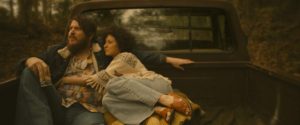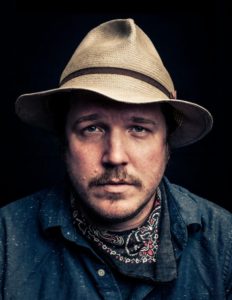By Chic DiCiccio

Photos courtesy of Ansgar Media
“Blaze” is director Ethan Hawke’s love letter to country singer Blaze Foley, a belligerent, surly drunk who was tragically killed at the age of 40. Blaze wasn’t a good husband, friendly to audiences or remotely close to any commercial success, but he was exceptional at one thing: writing country songs.
So, what makes “Blaze” so damn beautiful? Well, for one, the care and precision put into every frame and word by writer/director Ethan Hawke. He and co-writer Sybil Rosen (based on her book about her relationship with Blaze) mix the bitter and the sweet without pulling any punches or sugarcoating a man with deep, deep flaws.
But mostly, “Blaze” becomes an absolute gem due to Ben Dickey’s portrayal of the titular character. The movie not only benefits from this being Dickey’s first film, but becomes more astonishing due to his truly heartbreaking and captivating performance.
There are two narratives used that cleverly flash back to Blaze’s life, mostly taking place from the late 1970s to late ’80s. One narrative shows Blaze’s almost “made it” career and his painful, yet inevitable fall. His failures as a musician are detailed in a radio interview with his friends and collaborators, Townes Van Zandt (Charlie Sexton) and Zee (Josh Hamilton).
The other section of “Blaze” is the heart and soul of the film. Blaze, in an effort to finally have his music on tape, records a live performance in an Austin, Texas bar called The Outhouse. As he performs each song, he thinks back to his life with Sybil (Alia Shawkat), who essentially was his muse. Every single song is about their former life together as they moved from a remote treehouse in Georgia then to single room apartments in Austin and Chicago.
Even though Blaze never once makes the right decision, the movie never becomes annoying. Blaze and Sybil’s relationship is engrossing, precious and never overly sweet. The warts are completely present, such as the trickiness of navigating Sybil’s Jewish upbringing versus Blaze’s rejection of religion. It’s all due to Dickey and Shawkat, who inhabit these roles as if they’ve been rehearsing for years. Shawkat, mostly recognizable due to her role in “Arrested Development,” abandons any typecasting and becomes Blaze’s main (if only) motivation with ease. She so disappears into the role that even when you know she needs to leave him, you want to beg her to stay just to see them share another scene together.

Dickey, a musician by trade, should probably prepare for a slight career change. This is potentially the finest first-time appearance by an actor in movie history. His tears feel real, his rudeness often comes off as charm, and he looks larger than life when on stage. Dickey even manages to make you believe that he’ll succeed when history says otherwise.
No matter what, “Blaze” belongs to Ethan Hawke and his cinematographer, Steve Cosens. Every shot looks like the late ’70s and when they allow the camera to simply linger on a Texas sunset, it’s gorgeous and never pretentious. All of the bars, houses, apartments and street corners are lit in ways that provide maximum style and beauty.
Hawke really has a sleeper masterpiece on his hands. “Blaze” is as fine a music biopic ever made and, like its subject, wears its love for Texas music on its sleeve. It’s never phony, never forced and, even though you know how it will tragically end, it still hits like a ton of bricks.
